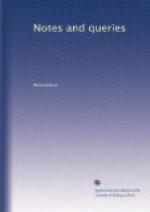“Sir Edward Greene, created a Baronet, 26 July, 1660, was seated at Little Sampford in Essex; he had 3 wives, the first was Jeronyma, daughter and coheir of William Everard, of Linsted, Esq., and by her he had 6 daughters; by Mary, daughter of —— Tasborough, he had a son; and by the third lady ——, daughter of —— Simonds, he had a daughter. He was the last of the Greenes that enjoyed this estate, having lost it by gaming.”—Morant’s Essex, vol. ii. p. 525.
This account of the Greene family is stated in a note to have been taken from a fine pedigree on vellum, penes T. Wotton, Gent.
If Catherine Pegge was one the three ladies mentioned above, she must have changed her name previously to her marriage, in hopes of concealing her former history; but the circumstance of the baronetcy being conferred upon Sir Edward is very suspicious. Probably some of your correspondents can settle the question.
BRAYBROOKE.
Audley End, Jan. 19. 1850.
* * * * *
WILLIAM BASSE, AND HIS POEMS.
Can any of your readers inform me where a perfect or imperfect copy is to be found of a poem, of which I possess only a single half sheet, under the following title:—
“Great Brittaines
Sunnes-set, bewailed with a Shower of Teares.
By William Basse.
At Oxford, Printed by Joseph Barnes. 1613”?
It is one of the many poems published on the death of Prince Henry; and although I have been in search of it, or of a fragment of it, for more than twenty years, I have never been able to obtain tidings of more than of that small portion in my possession; nor am I aware of the mention of it in any bibliographical authority. I have not at hand Sir H. Nicolas’s edition of Walton’s Angler, in which Basse is spoken of, but I remember looking at that beautiful and costly work a long time ago, and, as far as I recollect, not finding in it anything to my purpose. I observe that a William Basse (or Bas, as the name is there spelt) printed in 1602, 4to., a tract called Sword and Buckler, or Serving Man’s Defence; but I know no more of it than that it was sold in Stevens’s sale; and among the MSS. of the late Mr. Heber was a volume of poems called Polyhymnia, apparently prepared for the press, and dedicated by William Basse to Lady Lindsey, which contained an “Elegie on a rare Singing Bull-finch,” dated 19th June, 1648; so that he was still living nearly half a century after he had printed his earliest known performance.
The production that Izaac Walton refers to must be the ballad preserved in the Pepys Collection at Cambridge, under the heading “Maister Basse his Careere, or the new Hunting of the Hare. To a new Court tune;” and beginning—
“Long ere the morne expects the returne.”




